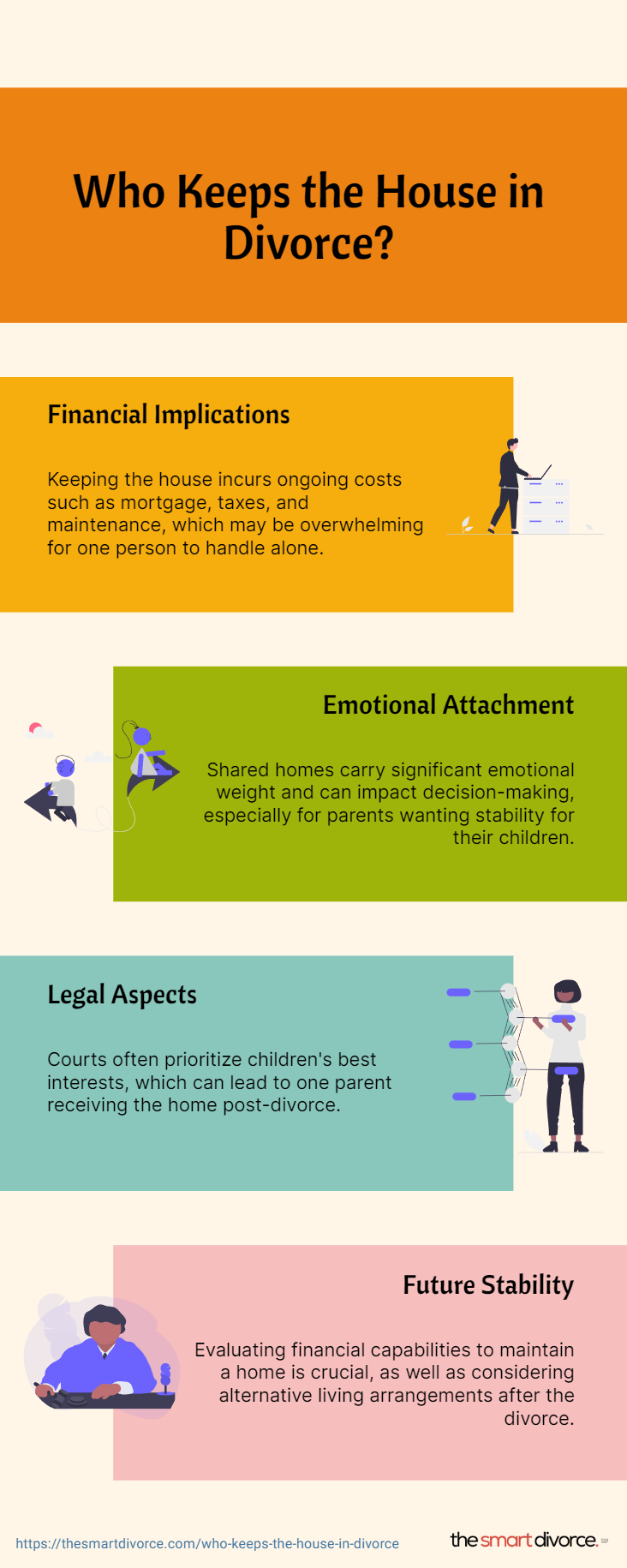Divorce can be a complicated and emotionally draining process, especially when it comes to dividing assets like the family home. One of the most common questions is: Who keeps the house in divorce? The answer can be complicated and depends on various financial and legal factors. In this blog post, we’ll explore the key considerations and strategies involved in deciding who gets to keep the house, focusing on the financial implications of this critical decision.
Understanding the House as a Marital Asset
First, it’s essential to recognize that a house purchased during a marriage is typically considered a marital asset. This means it belongs to both parties, regardless of whose name is on the mortgage or title. Here are a few critical points to understand:
- Marital Asset Definition: Any property acquired during the marriage is usually seen as a shared asset, subject to division upon divorce.
- Equity and Ownership: Even if only one spouse’s name is on the title, both may have rights to the property’s equity, which is the difference between the home’s market value and any outstanding mortgage.
- Legal Implications: The divorce decree will determine how these assets are divided, and it is essential to understand the legal rights and responsibilities involved.
Financial Considerations for Keeping the House
If you’re considering keeping the house after your divorce, you must evaluate several financial aspects to determine if this is feasible and beneficial. Here’s what you need to consider:
- Mortgage and Refinancing:
- Refinancing Requirements: If both spouses are on the mortgage and want to keep the house, they typically must refinance to remove the other’s name from the loan. This could involve qualifying for a new mortgage on your own.
- Equity Buyout: To buy out your spouse’s share of the home, you must pay them half of the equity. For example, if the house is worth $400,000 and you have a $300,000 mortgage, the equity is $100,000. You would need to pay your spouse $50,000 to keep the house.
- Affordability and Budgeting:
- Assessing Affordability: Can you maintain the mortgage payments, property taxes, insurance, and maintenance costs on a single income? Creating a detailed budget is crucial to ensure you can handle these expenses.
- Financial Stability: Consider the long-term economic stability of keeping the house. Would selling the house and splitting the equity make more financial sense, allowing for a fresh start without the burden of a large mortgage?
- Alternatives to Keeping the House:
- Selling the House: Sometimes, selling the house and dividing the proceeds may be the best option, especially if neither spouse can afford the mortgage alone.
- Trading Assets: Another approach might involve one spouse keeping the house in exchange for other valuable marital assets, such as retirement accounts or investments. This ensures an equitable distribution without necessarily dividing every asset.
How a Certified Divorce Financial Analyst (CDFA) Can Help
Navigating the financial complexities of divorce, particularly when it comes to valuable assets like the family home, can be challenging. A Certified Divorce Financial Analyst (CDFA) can play a crucial role in this process by:
- Providing Expert Analysis: A CDFA helps you understand the full financial impact of keeping or selling the house, including taxes, mortgage payments, and long-term investment potential.
- Creating Financial Strategies: They work with you to develop a strategy that aligns with your financial goals and needs, whether keeping the house or exploring other asset distribution options.
- Assisting with Negotiations: A CDFA can support you during mediation or negotiations, ensuring you make informed decisions that protect your financial interests.
Emotional Considerations and Practical Tips
While the financial aspects are paramount, it’s also essential to consider the emotional impact of your decision. Here are some practical tips to help you navigate this challenging decision:
- Evaluate Emotional Attachment: Consider how emotionally attached you are to the house and whether keeping it’s worth the financial strain.
- Think About the Future: Consider if keeping the house fits into your long-term plans, such as retirement or relocation. A home that’s affordable today might become a financial burden later.
- Consult Professionals: Besides a CDFA, consider consulting a real estate agent and a divorce mediator to explore your options thoroughly.
Final Thoughts
Deciding who keeps the house in a divorce is more than just a financial decision; it’s a deeply personal one that involves weighing emotional attachment against practical realities. By carefully considering the economic implications and seeking expert advice, you can make an informed choice that supports your long-term financial stability and personal well-being.
At The Smart Divorce
At The Smart Divorce, we understand the complexities and emotions involved in deciding who keeps the house during a divorce. Our team of experienced mediators and Certified Divorce Financial Analysts is here to guide you through every step of the process, ensuring your decisions are informed, fair, and in your best interest. If you’re facing a similar situation and need guidance, we invite you to connect with us. Schedule a complimentary Get-Acquainted Call today here, and let us help you navigate this challenging time with clarity and confidence.
Key Takeaways
- House as a Marital Asset: In most cases, a house bought during a marriage is considered a marital asset and belongs to both spouses.
- Equity Considerations: The equity in the house is divided equally, regardless of whose name is on the mortgage or title.
- Refinancing and Affordability: To keep the house, one spouse must refinance to buy out the other’s share and afford the ongoing costs.
- Alternative Solutions: Selling the house or trading assets can be viable alternatives to keeping the house.
- Role of a CDFA: A Certified Divorce Financial Analyst can help evaluate the financial impact, assist with negotiations, and develop a tailored strategy.
- Budgeting for the Future: It’s crucial to assess whether you can afford the house on a single income, considering all associated costs.
- Emotional Attachment: Understand the emotional reasons for wanting to keep the house and weigh them against financial realities.
- Legal Rights and Responsibilities: Understand your legal rights to the house and any responsibilities for refinancing or buying out your spouse.
- Long-Term Planning: Consider the long-term implications of keeping or selling the house regarding financial stability and life goals.
- Seek Professional Advice: Work with professionals like a CDFA and a divorce mediator to explore all your options.
- Complementary Call to Action: The Smart Divorce offers support and guidance to help you make the best decision for your circumstances.


